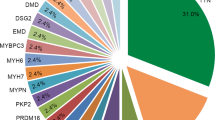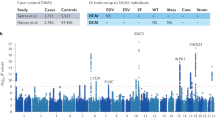Abstract
There is a high prevalence of heart failure (HF) in the general population, but it is more common in black people. We evaluated the association between genomic ancestry and mitochondrial haplogroups (mt-haplogroups) with HF etiology in 503 Brazilian patients. We elicited Mt-haplogroups by analyzing the control region of mitochondrial DNA, and genomic ancestry, by using 48 autosomal insertion–deletion ancestry informative markers. Hypertensive (28.6%, n=144) and ischemic (28.4%, n=143) etiologies of HF were the most prevalent herein. Our results showed that 233 individuals (46.3%) presented African mitochondrial (mt)-haplogroups, and the major contribution in the genomic ancestry analysis was the European ancestry (57.5% (±22.1%)). African mt-haplogroups were positively associated with a diagnosis of hypertensive cardiomyopathy (odds ratio, OR 1.55, confidence interval, CI 95% 1.04–2.44, P=0.04) when compared with European mt-haplogroups. Regarding the genomic ancestry, the African ancestry variant had higher risks (OR 7.84, 95% CI 2.81–21.91, P<0.001), whereas the European ancestry variant had lower risks (OR 0.14, 95% CI 0.04–5.00, P<0.001) for developing the hypertensive etiology. In addition, European ancestry showed an OR of 4.05 (CI 95% 1.53–10.74, P=0.005), whereas African ancestry showed an OR of 0.17 (CI 95% 0.06–0.48, P=0.001) for developing ischemic etiology. In conclusion, this study supports the importance of using ancestry informative markers and mitochondrial DNA to study the genetics of complex diseases in admixed populations to improve the management, treatment and prevention of these illnesses. Therefore, the ancestry informative markers and mt-haplogroups could provide new biomarkers to be associated with HF etiologies and be used as a premise for more specific management.
This is a preview of subscription content, access via your institution
Access options
Subscribe to this journal
Receive 12 digital issues and online access to articles
$119.00 per year
only $9.92 per issue
Buy this article
- Purchase on Springer Link
- Instant access to full article PDF
Prices may be subject to local taxes which are calculated during checkout
Similar content being viewed by others
References
Bocchi EA, Marcondes-Braga FG, Bacal F, Ferraz AS, Albuquerque D, Rodrigues D et al. Atualização da diretriz brasileira de insuficiência cardíaca crônica - 2012. Arq Bras Cardiol 2012; 98 (1): 1–33.
Huffman MD, Berry JD, Ning H, Dyer AR, Garside DB, Cai X et al. Lifetime risk for heart failure among white and black americans: cardiovascular lifetime risk pooling project. J Am Coll Cardiol 2013; 61 (14): 1510–1517.
Hunt SA . American College of CardiologyAmerican Heart Association Task Force on Practice Guidelines (Writing Committee to Update the 2001 Guidelines for the Evaluation and Management of Heart Failure). ACC/AHA 2005 guideline update for the diagnosis and management of chronic heart failure in the adult: a report of the American College of Cardiology/American Heart Association Task Force on Practice Guidelines (Writing Committee to Update the 2001 Guidelines for the Evaluation and Management of Heart Failure). J Am Coll Cardiol 2005; 46 (6): e1–82.
Bibbins-Domingo K, Pletcher MJ, Lin F, Vittinghoff E, Gardin JM, Arynchyn A et al. Racial differences in incident heart failure among young adults. N Engl J Med 2009; 360 (12): 1179–1190.
Aggarwal A, Gupta A, Pappas PS, Tatooles A, Bhat G . Racial differences in patients with left ventricular assist devices. ASAIO J 2012; 58 (5): 499–502.
Bahrami H, Kronmal R, Bluemke DA, Olson J, Shea S, Liu K et al. Differences in the incidence of congestive heart failure by ethnicity: the multi-ethnic study of atherosclerosis. Arch Intern Med 2008; 168 (19): 2138–2145.
Rathore SS, Masoudi FA, Wang Y, Curtis JP, Foody JM, Havranek EP et al. Socioeconomic status, treatment, and outcomes among elderly patients hospitalized with heart failure: findings from the National Heart Failure Project. Am Heart J 2006; 152 (2): 371–378.
Chen J, Dharmarajan K, Wang Y, Krumholz HM . National trends in heart failure hospital stay rates, 2001 to 2009. J Am Coll Cardiol 2013; 61 (10): 1078–1088.
East MA, Peterson ED, Shaw LK, Gattis WA, O'Connor CM . Racial differences in the outcomes of patients with diastolic heart failure. Am Heart J 2004; 148 (1): 151–156.
Gordon HS, Nowlin PR, Maynard D, Berbaum ML, Deswal A . Mortality after hospitalization for heart failure in blacks compared to whites. Am J Cardiol 2010; 105 (5): 694–700.
McKee PA, Castelli WP, McNamara PM, Kannel WB . The natural history of congestive heart failure: the Framingham study. N Engl J Med 1971; 285 (26): 1441–1446.
Richardson P, McKenna W, Bristow M, Maisch B, Mautner B, O'Connell J et al. Report of the 1995 World Health Organization/International Society and Federation of Cardiology Task Force on the Definition and Classification of cardiomyopathies. Circulation 1996; 93 (5): 841–842.
Bernardez-Pereira S, Santos PC, Krieger JE, Mansur AJ, Pereira AC . ACTN3 R577X polymorphism and long-term survival in patients with chronic heart failure. BMC Cardiovasc Disord 2014; 14 (1): 90.
Giolo SR, Krieger JE, Mansur AJ, Pereira AC . Survival analysis of patients with heart failure: implications of time-varying regression effects in modeling mortality. PLoS One 2012; 7 (6): e37392.
Cardena MM, Ribeiro-Dos-Santos A, Santos S, Mansur AJ, Pereira AC, Fridman C . Assessment of the relationship between self-declared ethnicity, mitochondrial haplogroups and genomic ancestry in Brazilian individuals. PLoS One 2013; 8 (4): e62005.
Leite TK, Fonseca RM, de França NM, Parra EJ, Pereira RW . Genomic ancestry,self-reported "color" and quantitative measures of skin pigmentation in Brazilian admixed siblings. PLoS One 2011; 6 (11): e27162.
Pena SDJ . Razões para banir o conceito de etnia da medicina brasileira. História, Ciência, Saúde – Manguinhos 2005; 12 (1): 321–346.
Franceschini N, Le TH . Genetics of hypertension: discoveries from the bench to human populations. Am J Physiol Renal Physiol 2014; 306 (1): F1–F11.
Mune T, Rogerson FM, Nikkila H, Agarwal AK, White PC . Human hypertension caused by mutations in the kidney isoenzyme of 11β-hydroxysteroid dehydrogenase. Nat Genet 1995; 10: 394–399.
Watson B Jr, Khan MA, Desmond RA, Bergman S . Mitochondrial DNA mutations in black Americans with hypertension-associated end-stage renal disease. Am J Kidney Dis 2001; 38 (3): 529–536.
González J, Valls N, Brito R, Rodrigo R . Essential hypertension and oxidative stress: new insights. World J Cardiol 2014; 6 (6): 353–366.
Vara D, Pula G . Reactive oxygen species: physiological roles in the regulation of vascular cells. Curr Mol Med 2014; 14 (9): 1103–1125.
Lai CQ, Tucker KL, Choudhry S, Parnell LD, Mattei J, García-Bailo B et al. Population admixture associated with disease prevalence in the Boston Puerto Rican health study. Hum Genet 2009; 125 (2): 199–209.
Kosoy R, Qi L, Nassir R, Garcia L, Allison M, Shigeta R et al. Relationship between hypertension and admixture in post-menopausal African American and Hispanic American women. J Hum Hypertens 2012; 26 (6): 365–373.
Shahabi A, Wilson ML, Lewinger JP, Goodwin TM, Stern MC, Ingles SA . Genetic admixture and risk of hypertensive disorders of pregnancy among Latinas in Los Angeles County. Epidemiology 2013; 24 (2): 285–294.
Franceschini N, Fox E, Zhang Z, Edwards TL, Nalls MA, Sung YJ et al. Genome-wide association analysis of blood-pressure traits in African-ancestry individualsreveals common associated genes in African and non-African populations. Am J Hum Genet 2013; 93 (3): 545–554.
Zhu X, Luke A, Cooper RS, Quertermous T, Hanis C, Mosley T et al. Admixture mapping for hypertension loci with genome-scan markers. Nat Genet 2005; 37 (2): 177–181.
Brown CD, Higgins M, Donato KA, Rohde FC, Garrison R, Obarzanek E et al. Body mass index and the prevalence of hypertension and dyslipidemia. Obes Res 2000; 8 (9): 605–619.
Marcuello A, Martínez-Redondo D, Dahmani Y, Terreros JL, Aragonés T, Casajús JA et al. Steady exercise removes VO(2max) difference between mitochondrial genomic variants. Mitochondrion 2009; 9 (5): 326–330.
Marroni AS, Metzger IF, Souza-Costa DC, Nagassaki S, Sandrim VC, Correa RX et al. Consistent interethnic differences in the distribution of clinically relevant endothelial nitric oxide synthase (eNOS) genetic polymorphisms. Nitric Oxide 2005; 12 (3): 177–182.
Martínez-Redondo D, Marcuello A, Casajús JA, Ara I, Dahmani Y, Montoya J et al. Human mitochondrial haplogroup H: the highest VO2max consumer—is it a paradox? Mitochondrion 2010; 10 (2): 102–107.
Rea IM, McNerlan SE, Archbold GP, Middleton D, Curran MD, Young IS et al. Mitochondrial J haplogroup is associated with lower blood pressure and anti-oxidant status: findings in octo/nonagenarians from the BELFAST Study. Age (Dordr) 2013; 35 (4): 1445–1456.
Freedman BI, Divers J, Palmer ND . Population ancestry and genetic risk for diabetes and kidney, cardiovascular, and bone disease: modifiable environmental factors may produce the cures. Am J Kidney Dis 2013; 62 (6): 1165–1175.
Budoff MJ, Nasir K, Mao S, Tseng PH, Chau A, Liu ST et al. Ethnic differences of the presence and severity of coronary atherosclerosis. Atherosclerosis 2006; 187 (2): 343–350.
Coronary Artery Disease (C4D) Genetics Consortium. A genome-wide association study in Europeans and South Asians identifies five new loci for coronary artery disease. Nat Genet 2011; 43 (4): 339–344.
Erdmann J, Linsel-Nitschke P, Schunkert H . Genetic causes of myocardial infarction: new insights from genome-wide association studies. Dtsch Arztebl Int 2010; 107 (40): 694–699.
Wojczynski MK, Li M, Bielak LF, Kerr KF, Reiner AP, Wong ND et al. Genetics of coronary artery calcification among African Americans, a meta-analysis. BMC Med Genet 2013; 14: 75.
Kessler T, Erdmann J, Schunkert H . Importance of modern genome-wide studies for the risk of myocardial infarction. Internist (Berl) 2014; 55 (2): 141–147.
CARDIoGRAMplusC4D Consortium, Deloukas P, Kanoni S, Willenborg C, Farrall M, Assimes TL et al. Large-scale association analysis identifies new risk loci for coronary artery disease. Nat Genet 2013; 45 (1): 25–33.
Acknowledgements
This study was supported by FAPESP (Fundação de Amparo à Pesquisa do Estado de São Paulo), CAPES (Coordenação de Aperfeiçoamento de Pessoal de Nível Superior) and HC-LIM/FMUSP.
Author information
Authors and Affiliations
Corresponding author
Ethics declarations
Competing interests
The authors declare no conflict of interest.
Rights and permissions
About this article
Cite this article
Cardena, M., Ribeiro-Dos-Santos, A., Santos, S. et al. Mitochondrial and genomic ancestry are associated with etiology of heart failure in Brazilian patients. J Hum Hypertens 30, 120–123 (2016). https://doi.org/10.1038/jhh.2015.39
Received:
Revised:
Accepted:
Published:
Issue Date:
DOI: https://doi.org/10.1038/jhh.2015.39



